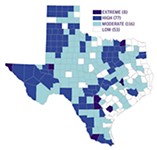Kitty-Puppy Lawsuit, Round One
Powers of neighborhood plans tested by citizens suing city
By Katherine Gregor, Fri., Jan. 18, 2008

The initial news was good for citizens seeking to stop the city from moving the Town Lake Animal Center to East Austin through a lawsuit, PODER, et al. v. City of Austin. As characterized by attorney Bill Aleshire of Riggs & Aleshire, who represents an East-West Austin plaintiffs' coalition, "City attorneys claimed our lawsuit should be thrown out because they said citizens could not enforce the City Charter against the City Council." But Travis Co. District Court Judge Lora Livingston denied the city's argument of "special exceptions."
People Organized in Defense of the Earth and Her Resources and friends claim City Council and the city manager unlawfully approved a $1.5 million architectural contract for the animal shelter at a new East Austin location – because the city's adopted Govalle/Johnston Terrace Neighborhood Plan had not first been amended to include the new shelter. They also claim an Open Meetings Act violation. Aleshire explained by e-mail, "Now the City will have to stand trial on whether they can locate the animal shelter (or any public facility) in a neighborhood without first including that project in the neighborhood's plan." The petition has been amended to sue Mayor Will Wynn, each council member, and City Manager Toby Futrell in their individual capacities: "Since we allege that they exceeded their authority to authorize that contract, we must sue them individually." That also goes for Mike Martinez, who voted against the site but for the architectural contract on consent. Aleshire believes a ruling in PODER's favor would set a far-reaching precedent empowering neighborhood plans. He said the lawsuit points to "previously ignored" City Charter provisions (Article X, sections 5 and 6) that specifically require council to include in its Comprehensive Plan its capital-improvement projects – such as building a new facility. (Upon adoption, each neighborhood plan becomes part of the comprehensive plan.) "In other words, Charter provisions require the City Council to amend its Plan first, then implement its city projects," Aleshire said.
In the future, prior to locating any major new city facility within a neighborhood, city staff and ultimately council would have to work with the designated neighborhood-planning team to formally amend the neighborhood plan, he stated. A citizen win also could put additional pressure on the city to update its long-outdated 1979 comprehensive plan – some specific provisions of which no one at City Hall has apparently dusted off in quite awhile. A cleanup of the plan was initiated by council last month.
But city attorney Anne Morgan disagreed with Aleshire's assertions: "Our position is that there's no amendment required, because it's consistent with the zoning and the future land-use map." She added, "We have a fundamental disagreement – it doesn't look to me that anything [in the City Charter] would require an amendment to the plan." Indeed, the tract was specified in the neighborhood plan and accompanying map as a public/civic tract. Morgan asserted that neighborhood plans "certainly should be respected as a guide," but "it's too narrow a reading to say that everything that ever happens requires an amendment. We'd never get anything done." (Does every curb cut require a formal plan-amendment process?) But if the judge does rule in the plaintiffs' favor, Morgan said, the city could possibly rethink how it proceeds with capital-improvement projects not cited in neighborhood plans. "It's hard for me to say, but it would certainly make us look at it again."
Aleshire also pointed to council's failure to respect and follow adopted neighborhood plans as having political consequences for council members, particularly those running for re-election in May. "This lawsuit is sort of a poster child for the new BATPAC," he stated, referring to the newly formed political action committee Better Austin Today, a progressive coalition pressing for tighter council adherence to neighborhood plans and greater accountability to citizens overall.
Got something to say on the subject? Send a letter to the editor.










